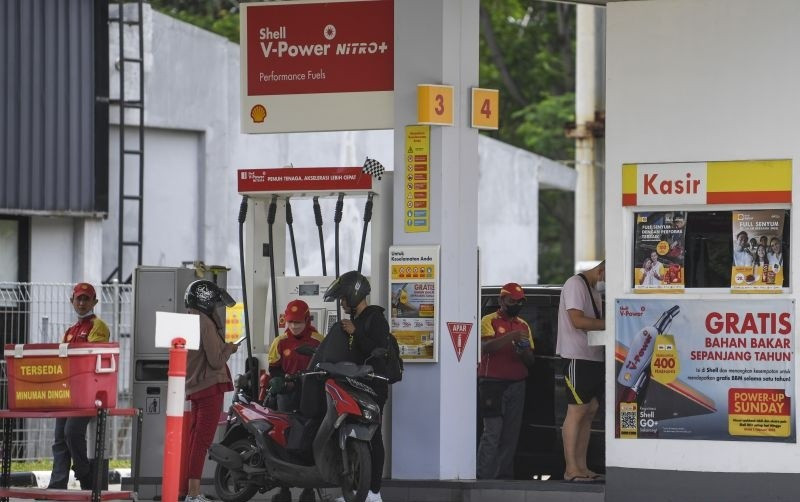News
When Shell runs dry, Pertamina steps back in
Tenggara Strategics September 13, 2025 An employee fills a customer's vehicle on March 9, 2023, with fuel at a Shell gas station in Jakarta. (Antara/M Risyal Hidayat) (Antara/M Risyal Hidayat)
An employee fills a customer's vehicle on March 9, 2023, with fuel at a Shell gas station in Jakarta. (Antara/M Risyal Hidayat) (Antara/M Risyal Hidayat)
Shortages have gripped Indonesia once again, with Shell, BP and Vivo fuel stations running low in several regions. The fuel shortages have caused long lines at Shell, BP and Vivo stations as well as increased demand at state-owned Pertamina stations, despite scandals over low-quality fuel.
The contrast between empty pumps at foreign-owned stations and eroded trust in the national supplier highlights the fragility of fuel distribution and the difficult choices consumers face.
In response, Energy and Mineral Resources Minister Bahlil Lahadalia said the government had approved a 10 percent increase in fuel import quotas for private retailers in 2025. While this announcement may provide some relief, it offers little to address the current crisis. Shell and other private retailers need immediate allocations to keep their stations supplied, not just commitments for the future.
Bahlil has framed the current disruption as an opportunity for business-to-business collaboration, suggesting that private retailers could source supply directly from Pertamina. However, the reliance on the state-owned company feels like a step backward and a hindrance to market liberalization, for many.
The shortage has not been caused by a surge in demand. Indonesia’s economy grew 5.12 percent in the second quarter of 2025, but overall fuel consumption has remained relatively stable, with no sharp spike to explain the supply gap. The primary cause lies in recent regulatory changes. Until last year, import permits for private retailers were valid for 12 months. Since 2025, they expire after six months.
The shortened procurement period has disrupted logistics, forcing private companies to reorganize and adjust their infrastructure on a much shorter timeline. This challenge has proven difficult for many to overcome smoothly.
Recognizing this, the government has announced plans to conduct quarterly evaluations of the quota system. These reviews, which aim to stabilize supply, highlight the persistent imbalance between Pertamina and its competitors.
Pertamina remains the ultimate guarantor of energy security, while foreign retailers operate at the margins, leaving them vulnerable to sudden regulatory shifts.
This imbalance raises a broader question of whether Indonesia can sustain genuine competition in its downstream fuel sector.
If regulatory burdens persist and shortages recur, companies like Shell, BP and Vivo may scale down operations or exit the market altogether. Such a withdrawal would reduce consumer choice and further entrench Pertamina’s monopoly.
For now, Pertamina’s dominance is reinforced. Bahlil has encouraged private retailers to secure supply directly from Pertamina, saying that the state-owned company exists to ensure Indonesians are never left without fuel, especially when private operators falter.
However, this reliance comes at a delicate time. In February 2025, Pertamina was hit by a corruption scandal involving inflated prices and the mixing of fuel in ways that could compromise vehicle safety. Motorists were paying more for lower-quality fuel according to some reports, which could lead to higher maintenance costs and shorter engine life. These revelations drove many consumers toward private fuel stations, even at higher prices.
While Pertamina still holds an advantage as the guarantor of availability, its reputation for quality and transparency has been severely damaged. Shell and other foreign retailers face the opposite issue. Consumers may believe their fuel is of higher quality, but empty pumps can undermine confidence just as quickly as a scandal.
The current shortages at Shell, BP and Vivo, coupled with Pertamina’s recent controversies, have left the fuel market in a state of limbo.
Liberalization exists in theory, but in practice, the market remains heavily tilted toward a single state-owned supplier. For motorists, the implications are immediate: longer lines, higher costs and difficult trade-offs. For the government, the challenge is bigger: whether Indonesia can create an energy sector that balances security, competition and public trust.
The scarcity of today should be read as more than an operational glitch; it is a warning. Unless regulatory consistency improves and confidence is restored in both Pertamina and private retailers, Indonesia risks sliding back into dependence on a single monopoly. This powerful entity, while capable of dominating, is fragile enough to drag the entire system down if it stalls.

